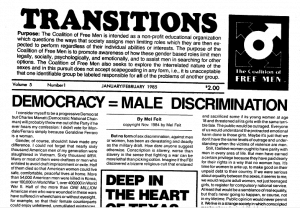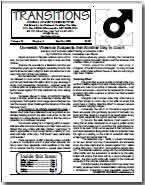 TRANSITIONS AND NCFM:
TRANSITIONS AND NCFM:
OUR HISTORY (STILL) IN THE MAKING
by Francis Baumli, Ph.D.
As archivist for back issues of Transitions, my role in The National Coalition for Men is, I daresay, highly crucial precisely because Transitions is the tactile part of belonging to NCFM. It is the part you can hold in your hands, assuring yourself that this is what you belong to. NCFM, through Transitions, brings members together in a forum for discussion, reporting on what our local groups are doing, while printing major articles that challenge our society and inspire members to confront society’s prejudices against men. The result is that the history of Transitions is now an important reflection of who we have been and who we are; thus, Transitions is both our repository and our vehicle. It recounts our struggles, documents our successes, and it even expresses our lighter side—the joy we take in our new-found roles, the pleasure our successes give us, and the fact that we are not without a sense of humor in dealing with that eternal struggle between men and women.
Back issues of Transitions (a considerable, though not complete, inventory) are available to anyone, free of charge, simply by contacting Francis Baumli, Ph.D. at: sudbaum@sbcglobal.net and stating what you want. This is only one of the many services NCFM provides through its charter as an educational institution.
What is curious for me is the fact that I have probably responded to more requests for back issues of Transitions in the last year than I have responded to in the last eight years. What does this mean? Perhaps our society, at a slow, reluctant, but inevitable pace, is moving in the direction of a new attitude toward men. People are curious about men, and they find that they are edified when they read Transitions. Also, not infrequently, they are moved to write about us because, for the common person, our perspective is a new one. (Old for us, yes; but new for the uninitiated, which includes too many people out there in our society.) The result is that I get requests for back issues of Transitions from the oddest places, but then when I put all these requests together, I see a pattern and I realize that these requests are not so odd after all. They reflect the fact that people are interested in reading about, or writing about, something that is new to them. For example, a woman in Australia working on a Master’s thesis, requested issues of Transitions dealing with false accusation in rape. She preferred this topic over the topic suggested by her advisor, which involved one more tiresome (and overdone) analysis of how Australia was colonized by the British. An entire class in women’s studies, at the University of Pennsylvania, was studying gender issues and several members of that class wanted back issues for a variety of topics. One young woman, with whom I had considerable follow-up, produced a stellar article on men’s feelings about an abortion that happens against their will. An Optimist Club wanted articles about men’s groups that do not call themselves men’s liberation groups, and very soon several Optimist Clubs from around the country were requesting issues of Transitions which do deal specifically with men’s liberation. A huge number of men want to know about their rights as parents. A considerable number of women want information on how to help their sons, brothers, or current husbands deal with false accusations of rape. A fellow working on a Ph.D. in history at the University of Chicago, not wanting to do one more pedantic dissertation about how the Industrial Revolution shaped Chicago, is instead interested in how new attitudes about fathering are reshaping civic policies that pertain to paternity leave for fathers.
In other words, our history is catching up with us. Or, said in a different way, our society is finally catching up with us. And if many of the back issues of Transitions are now quite old, unfortunately, the topics those issues deal with remain all too relevant. Men are still shackled by many of the same old gender constraints, and so our struggle continues. In this sense, if Transitions has recorded the history of our past, then it also presents the agenda we still need to work on.
Now, after 50 years of listening to feminists blaming men, their rhetoric has become a monotonous mantra of boring, predictable, and highly suspect clichés. The public is curious to know what other perspectives there are on gender issues, and in Transitions they are finding the information they want. Of course, not every reader is pleased with what our perspective is. For some readers it is too radical, for some it is an uncomfortable mirror, and for a few we are the enemy. But I do believe “the times they are a’ changing,” and for most, even if they read our views with some degree of caution, this caution does not amount to skepticism or rejection. Rather, spending time with Transitions occasions curiosity, discussion, scholarship, and (not infrequently) increased interest.
This means that Transitions, the repository for our history, makes that history come alive again. As a newsletter, Transitions deserves continued publication and readership. Back issues must continue to be available for readers whether they be cautious, curious, or eager. And, what now is especially good news, through the truly herculean efforts of our president, Harry Crouch, back issues of Transitions are being put into PDF files and will be available for reading at our website. Our history thus will be more easily available for those who prefer electronic access, and it will be more cheaply available because there will not be the expense of mailing out back issues of Transitions. Moreover, since the day will come when the “hard copies” of those back issues of Transitions have all been given away, these back issues will nevertheless remain perpetually available in their electronic form.
The National Coalition for Men has been the most consistently vigorous men’s rights organization in the history of the men’s movement. Its newsletter, Transitions, has often been more than a newsletter—its scope, influence, and sheer heft have given it the character of a journal. It has been our voice for over three decades now, and that voice will not fall silent. We remain available in hard print, available in PDF files at The National Coalition for Men website, and Transitions also is available in Xerox form at the Changing Men Collections at Michigan State University in East Lansing. You can go to their website at: http://specialcollections.lib.msu.edu/ and you will be amazed at how much of our history is available: including pamphlets about conferences, special publications, even recordings of our lecture series! Summarily stated, our history is readily accessible and can be studied by anyone who wishes to review it. It also is true that the history of NCFM will never quite succeed at being history since the agenda of liberating men, and raising society’s awareness about men, is a process that, now begun, will persist into what always is the present and the future—precisely because of the momentum already given it by the National Coalition for Men.
___________________________________________________________
NCFM NOTE: Six complete editions available for review here: Transitions . Over 120 back issues of Transitions are available to active members of NCFM. A member is “active” is their dues are paid and current. You can join Online here . Transitions is without question one of the world’s greatest collections of writing about the rights of men; or, the absence thereof.



